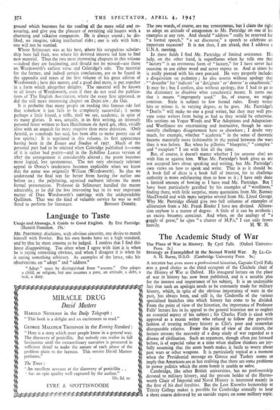Language to Taste
Usage and Abusage, A Guide to Good English. By Eric Partridge. (Hamish Hamilton. 15s.■ Usage and Abusage, A Guide to Good English. By Eric Partridge. (Hamish Hamilton. 15s.■ MR. PARTRIDGE disclaims, with obvious sincerity, any desire to match himself with Fowler. But his own books have set a high standard, and by that he must consent to be judged. I confess that I find this latest disappointing. Too often when I agree with him it is when he is saying something obvious, and when I disagree it is when he is saying something arbitrary. As examples of the latter, take his observations on " adopt " and "address."
"Adopt" must be distinguished from "assume." One adopts a child, or religion, but one assumes a pose, an attitude, a debt, a task, a duty.
The two words, of course, are not synonymous, but I claim the right to adopt an attitude of antagonism to Mr. Partridge on one of his examples at any rate. And should " address " really be reserved for "a formal speech," "a set discourse," a speech to celebrate an important occasion? It is not thus, I am afraid, that I addresi a U.N.A. meeting.
In these fields I find Mr. Partridge of limited assistance. His help, on the other hand, is superfluous when he tells one that " lactory " is an erroneous form of " lactary," for I have never had occasion to use either word and never expect to. And at times he is really pierced with his own poniard. He very properly includes a disquisition on pedantry ; he also asserts without apology that " describe' for indicate' or ' designate ' or denote ' is catachrestic." It may be ; but I confess, also without apology, that I had to go to the dictionary to disch'ver what catachrestic meant. It turns out that it means "improperly used." So, of course, we might continue. Style is subject to few formal rules. Every writer hits or misses it, in varying degree, as he goes. Mr. Partridge's " Don'ts " will make no one a good writer, but they may well pre- vent some writers from being as bad as they would be otherwise. His sections on Vogue Words and War Adoptions and Adaptations and Woolliness are entertaining and instructive, though he occa- sionally challenges disagreement here as elsewhere ; I doubt very much, for example, whether " academic " in the sense of theoretic became materially more fashionable in the period between the wars than it was before. But when he pillories "blueprint," " complex " and "escapism" I am with him all the time.
But, of course, it doesn't matter whether I (or anyone else) am with hint or against him. What Mr. Partridge's book gives us are not accepted laws about speaking and writing, but Mr. Partridge's own views on how to speak and write. That is as it should be. A book full of dicta is a book full of interest, for to challenge authority is more exhilarating than to bow to it ; I have only done a limited amount of bowing as I have read Mr. Partridge. But I have been particularly gratified by his examples of "woolliness," finding there, with little surprise, many quotations from Mr. Ramsay MacDonald and with Titre surprise several from Mr. Lloyd George. Why Mr. Partridge should give two full columns of examples of alliteration from a Mr. Frank Binder I have not divined. Allitera- tion anyhow is a matter of degree. A little of it can be aesthetic ; an excess becomes atrocious. And when, on the analogy of "a waggle of geese," he cites "a chatter of M.P.s," I can only frown


































 Previous page
Previous page